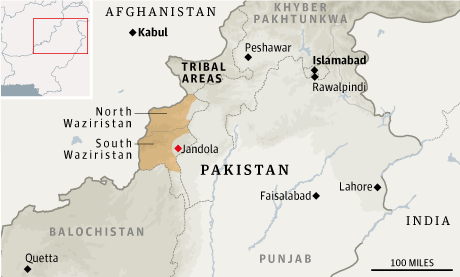US women may stage hunger strike in Pakistan in anti-drones protest
Code Pink activists gathered in Islamabad ready to join march led by Imran Khan into tribal region bordering Afghanistan

Not content with a planned march into one of Pakistan's most dangerous regions, a group of American women consider mounting a hunger strike outside the US embassy in Islamabad as part a campaign against CIA drone attacks in the country.
Thirty-five activists from Code Pink, a US anti-war group, have gathered in the Pakistani capital this week as they prepare for an unprecedented march and political rally in South Waziristan, one of the semi-autonomous tribal areas on the Afghan border, which is a hotbed of Taliban militancy.
Despite intense publicity surrounding the event, doubts persist over whether it will be able to take place. Local authorities have expressed strong doubts about the safety of the march, even though the Pakistani military has long claimed its operations in the area have brought a semblance of security.
Medea Benjamin, the veteran activist leading the Code Pink delegation, said: "Frankly, it's a win-win situation for us, whether we get into Waziristan or not.
"We are going because we are challenging the Pakistani government to allow us to go to a place that has been off limits but needs to be seen. And if they try to stop us, it will be clear they do not want the world to see what is going on there."
On Tuesday in Islamabad, the women met retired generals, ambassadors and even a former head of the notorious military spy agency Inter-Services Intelligence (ISI), and discussed other tactics to publicise their cause.
Those included mounting a hunger strike outside the US embassy in Islamabad. Benjamin said the group was still considering the idea.
"It was something a couple of members of the group brought up, but we wanted to wait until we got here to see how appropriate that might be," she said.
 The whole tribal belt has been off limits to foreigners since Taliban fighters started seeking sanctuary there
The whole tribal belt has been off limits to foreigners since Taliban fighters started seeking sanctuary there There was also a lengthy discussion about whether Pakistan, which publicly decries the drone campaign despite signs that it continues to give tacit approval, should attempt to shoot down US drones in its airspace.
On Wednesday, the women met people from North Waziristan who said they were victims of the US drone campaign, having lost relatives to missile strikes by the remote-controlled planes. They will also hold meetings with Pakistani and US government officials.
The group includes Mary Ann Wright, a former US diplomat and army colonel who condemned her country's covert drone campaign as Barack Obama's "personal execution device", in reference to the US president's weekly meeting at which he is reported to choose targets for missile strikes.
The march, led by Imran Khan and his Pakistan Tehreek-e-Insaf (PTI) party, is due to take place this weekend. Organisers hope to spend Saturday night in a town outside the tribal areas and then move on to Jandola, just inside the border of South Waziristan, where they will hold a rally.
The Taliban have given mixed signals over the march. In August, a spokesman said Khan would be targeted because he is a "liberal", but other reports have said the Taliban will support the march.
Supporters say Khan has been assured by General Ashfaq Kayani, the head of Pakistan's army, that if they go to South Waziristan they will remain safe.
The ambitions of march organisers have already been significantly downgraded. The original hope had been to travel to North Waziristan, a far more dangerous area rife with militants drawn from across the world.
The vast majority of drone strikes take place there, and the Pakistani army has almost no influence over the tribal area, where they have long-resisted US calls to mount military operations.
Nonetheless, although Jandola is in a relatively safe part of South Waziristan, all of the Federally Administered Tribal Areas (Fata) have been off limits to foreigners since the tribal belt became a sanctuary for Taliban groups fighting against Nato troops in Afghanistan and Pakistani government forces.
Few politicians have dared to campaign in the area. If successful, the march will cement Khan's position as a pre-eminent opponent of the US drone campaign.
Code Pink, which originally formed to oppose the second Iraq war, claimed its anti-drone campaign was still in its infancy. Benjamin said: "When it comes to drones, we are at the very beginning of turning public opinion against them in the US."
No virus found in this message.
Checked by AVG - www.avg.com
Version: 2013.0.2677 / Virus Database: 2591/5808 - Release Date: 10/03/12
No comments:
Post a Comment